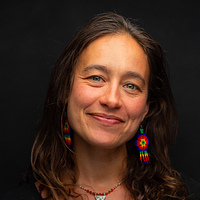- Orientation
- BizPlan
- BizPlan25
- Authentic Speaking
- Authentic Market Discovery
- Create Aligned Offers
- Joyful Productivity (Course)
- ✨ Authentic Outreach (AO)
- Joyful Pro
- Blog-to-Book
- 🚀 Course Creators
- 🖼️ Your Signature Framework
- 🙋 Effortless Yes
- 🌈 Energy Signature
- Meta Ads (FB / IG Advertising)
- 📱 Instagram Mastery
- 🎤️ Interview Mastery
- Launch Your Group Program
- Netcaring
- 🦸🏽✍🏽 Soulful Content (OGI)
- Substack Course
- "What do you do?"
- 🎬 YouTube Mastery

I am a personal and organizational coach, guide, mentor, ceremonialist, non-profit founder, artist, communitarian, and earth-lover. I have spent my life dedicated to the weaving of personal and collective transformation and liberation and supported hundreds of people from youth through adulthood, through transformational experiences that invoke a heart-full connection to self, community, earth, and spirit.
Of Jewish and Italian heritage, I was raised from a young age to be active in creating a world that is just for all. Stepping into leadership has been one of the most vulnerable experiences of my life and has stretched me to grow exponentially. My journey began in 8th grade as co-founder of the Philadelphia Student Union. More recently I served as co-curriculum designer and Youth Programs Director for Wilderness Torah, and then Founder and Executive Director of Gaia Passages, a non-profit dedicated to empowering girls and gender expansive youth through nature based mentorship and Rites of Passage. My current collaborative offerings include Wild Wisdom which offers nature-soul based wilderness journeys for womxn, and Re-turning Home Series, an on the land series reconnecting to Jewish wisdom through earth skills.
Whether working with individuals or groups, my coaching focuses on growing your inner and outer resources and discovering the answers that are already within when we slow down long enough to listen. From there it is easeful to see and take the steps that are truly aligned with your deepest callings and values.
I use an ontological coaching model combined with eco-therapeutic techniques and somatic awareness, which all support slowing down and listening closely. I draw from a wide variety of studies including in the fields of nature connection, energy psychology, intuitive guiding, somatic and parts work, and wilderness guiding. I am an ICF accredited coach, trained with the Academy for Coaching Excellence, one of the most rigorous training schools accredited by the International Coaching Federation (ICF).
In my personal life I am committed to a balance of work and play, progress and process, stillness and movement, and living into the paradoxes that make life juicy.
I am a personal and organizational coach, guide, mentor, ceremonialist, non-profit founder, artist, communitarian, and earth-lover. I have spent my life dedicated to the weaving of personal and collective transformation and liberation and supported hundreds of people from youth through adulthood, t…
